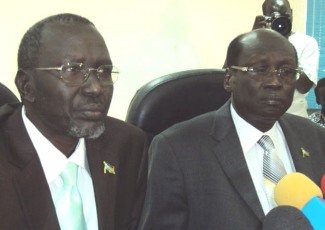Juba disputes Sudan’s ownership of Heglig, slams Bashir’s threats
April 19, 2012 (JUBA) – South Sudan sought on Thursday to justify its occupation of Heglig, accusing Khartoum of misrepresenting an international arbitration ruling that placed the oil-producing area outside of the contested Abyei region.

The standoff over Heglig, which contains oilfields producing almost half of Sudan’s daily output of 115,000 barrels, resulted from the failure of both sides to agree a number of issues including border demarcation, citizenship and oil exports.
A 2009 ruling by the Permanent Court of Arbitration (PCA), seated in The Hague, placed Heglig outside the boundaries of the hotly-contested region of Abyei.
But the ruling does not necessarily mean that Heglig is part of Sudan’s border state of South Kordofan, South Sudan information and media minister, Barnaba Marial Benjamin argued on Thursday, accusing Khartoum of misinterpreting the PCA’s verdict.
“The government of Sudan has intentionally misinterpreted the ruling to mean that Panthou [Heglig] is not part of South Sudan. The court did not rule on the border between north and South Sudan. It ruled only on the boundaries of the Abyei Area. It has nothing to do with the North-South border demarcation”, he told reporters in the South Sudanese capital, Juba.
Marial claimed that the Khartoum made a failed attempt to annex Panthou to South Kordofan when oil was discovered in the area in 1970’s, during the reign of former Sudanese president Jaffar Nimiryi, but later succeeded to do so in 2004.
“It is a known fact with documentary evidence that the same claim was made in 2004 when [Sudan’s current presidential assistant] Nafie Ali Nafie sent a council of ministers resolution number 25 dated June 14, 2004, to Joseph Monytuil who was a governor of Unity State at the time informing of the council’s decision transferring Heglig to western Kordofan. We have this document with us today”, Marial told journalists as he displayed the document written in Arabic.
According to Marial, Khartoum’s intention was “to tell the world that the oil was actually found within the northern territories but turned out later to be in the south”.
The South Sudanese official condemned Khartoum’s attempt to show his country in the bad light of being the aggressor, stressing that the SPLA was only reacting to attacks by the Sudanese army on Unity State.
Marial maintained Juba’s position that that the SPLA has not left South Sudanese territory as Heglig is one of the many demarcated areas of the 1,800 km border.
The minister claimed that Sudan’s long reluctance to demarcate the border explains the source of the ongoing tension and that international community should intervene to demarcate the border between the two sides.
He further dismissed the war rhetoric of Sudan’s president Al-Bashir who threatened on Wednesday to invade South Sudan to free its people from the ruling Sudan People’s Liberation Movement (SPLM) in Juba.
“We are not surprised. This is not the first time we are hearing such remarks coming out from the Sudanese regime. They have called us all names including being infidels before” he said.
Marial likened Al-Bashir’s statements to those of the late Libyan leader Muammar Al-Gaddafi who called Libyan citizens “rats” when they rebelled against him.
However, the minister Marial stressed that his country is “not at war” with Sudan and that they are still considering it as “friendly nation”.
(ST)
